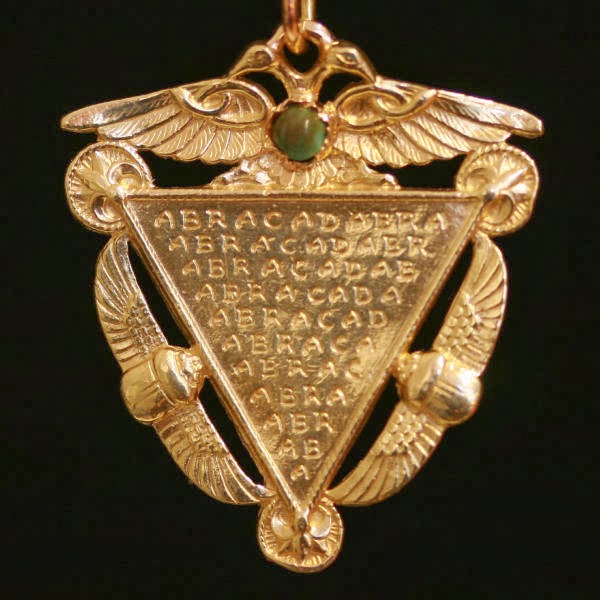It’s AD 200, and you’re in Ancient Rome. You’re also suffering from malaria,
which your local medicus has informed
you has been caused by inhaling the stagnant air of nearby swamps. He’s wrong
about that of course, but no matter—he has the
perfect cure.
Your
doctor is Quintus
Serenus Sammonicus, the Emperor’s personal physician and author of De medicina praecepta, “The Rules of
Medicine”, an epic third century work of Latin verse in which he outlines many of his most effective remedies. And in chapter 51, he explains his best cure for malaria.
The
patient, Sammonicus advises, should be given a piece of parchment, on which is
written the word ABRACADABRA. Below that is written ABRACADABR. Below that is ABRACADAB. Then below that is ABRACADA. Then ABRACAD. And so it continues, line by line, until
right at the bottom of the parchment is the single letter A.
This
inverted triangle of letters should be worn on a string around your neck, like
an amulet, and there it’ll act like a funnel channelling the illness out of
your body. In a few days, Sammonicus advises, you’ll be back to your usual self. As if by magic.
As
bizarre as all this might sound, this is actually the genuine history of abracadabra. Long before it was commandeered by second-rate magicians, abracadabra was considered a truly magical word, capable of
curing ills and precipitating good fortune. But
where does it and its magical powers come from? Unfortunately, no one is entirely sure.
One theory claims it’s an Aramaic invention, in which case it might mean something along the lines of “I create as I speak”, perhaps a line stolen from some early scriptural text. Alternatively, it could be a mangled version of the Hebrew words ab (“father”), ben (“son”) and ruach acadosch (“holy spirit”). Or maybe it’s just a distortion of abecedarius, a Latin word essentially meaning “alphabetical order”. Whatever the truth may be, it seems its origins are just as mysterious as its supposed magic powers.
One theory claims it’s an Aramaic invention, in which case it might mean something along the lines of “I create as I speak”, perhaps a line stolen from some early scriptural text. Alternatively, it could be a mangled version of the Hebrew words ab (“father”), ben (“son”) and ruach acadosch (“holy spirit”). Or maybe it’s just a distortion of abecedarius, a Latin word essentially meaning “alphabetical order”. Whatever the truth may be, it seems its origins are just as mysterious as its supposed magic powers.
But never mind all that. Back in Ancient Rome, you’re still unwell. So will Sammonicus’s cure actually work? Well, it’s unlikely—it’ll be another
1400 years before doctors begin routinely using quinine to cure malaria. So in the meantime, a little blind faith in an apparently magic word is probably your best hope...


Leave a comment!